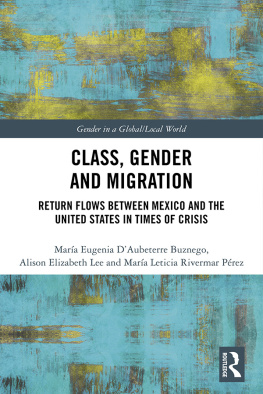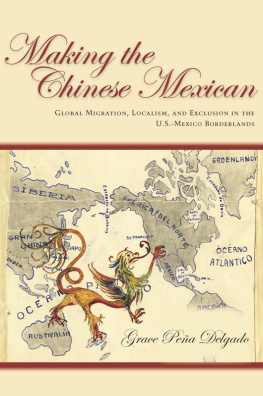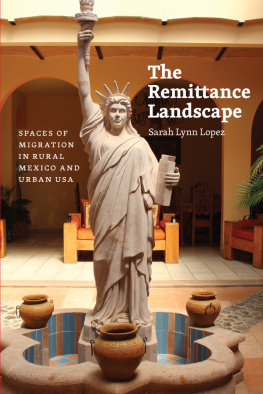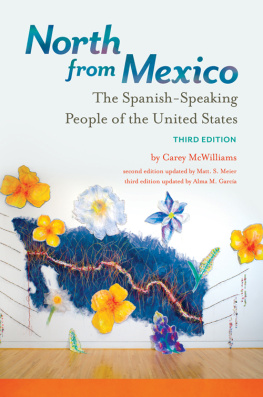Class, Gender and Migration
Using a gender-sensitive political economy approach, this book analyzes the emergence of new migration patterns between Central Mexico and the East Coast of the United States in the last decades of the twentieth century, and return migration during and after the global economic crisis of 2007.
Based on ethnographic research carried out over a decade, details of the lives of women and men from two rural communities reveal how neoliberal economic restructuring led to the deterioration of livelihoods starting in the 1980s. Similar restructuring processes in the United States opened up opportunities for Mexican workers to labor in US industries that relied heavily on undocumented workers to sustain their profits and grow. When the Great Recession hit, in the context of increasingly restrictive immigration policies, some immigrants were more likely to return to Mexico than others. This longitudinal study demonstrates how the interconnections among class and gender are key to understanding who stayed and who returned to Mexico during and after the global economic crisis. Through these case studies, the authors comment more widely on how neoliberalism has affected the livelihoods and aspirations of the working classes.
This book will be of key interest to scholars, students and practitioners in migration studies, gender studies/politics, and more broadly to international relations, anthropology, development studies, and human geography.
Mara Eugenia DAubeterre Buznego is Professor of Anthropology in the Social Science and Humanities Institute of the Benemrita Universidad Autnoma de Puebla, Mexico.
Alison Elizabeth Lee is Associate Professor in the Department of Anthropology at the Universidad de las Amricas Puebla, Mexico.
Mara Leticia Rivermar Prez is Professor of Anthropology in the Social Science and Humanities Institute of the Benemrita Universidad Autnoma de Puebla, Mexico.
Gender in a Global/Local World
Series Editors: Jane L. Parpart, University of Massachusetts Boston, USA,
Pauline Gardiner Barber, Dalhousie University, Canada, and
Marianne Marchand, Universidad de las Amricas, Puebla, Mexico.
Gender in a Global/Local World critically explores the uneven and often contradictory ways in which global processes and local identities come together. Much has been and is being written about globalization and responses to it but rarely from a critical, historical, gendered perspective. Yet, these processes are profoundly gendered albeit in different ways in particular contexts and times. The changes in social, cultural, economic and political institutions and practices alter the conditions under which women and men make and remake their lives. New spaces have been createdeconomic, political, socialand previously silent voices are being heard. North-South dichotomies are being undermined as increasing numbers of people and communities are exposed to international processes through migration, travel, and communication, even as marginalization and poverty intensify for many in all parts of the world. The series features monographs and collections which explore the tensions in a global/local world and includes contributions from all disciplines in recognition that no single approach can capture these complex processes.
Women, Gender, Remittances and Development in the Global South
Edited by Ton van Naerssen, Lothar Smith, Tine Davids and Marianne H. Marchand
Gender Transitions Along Borders
Marlene Sols
Rethinking Silence, Voice and Agency in Contested Gendered Terrains
Beyond the Binary
Edited by Jane L. Parpart and Swati Parashar
Gender and Island Communities
Edited by Firouz Gaini and Helene Pristed Nielsen
Class, Gender and Migration
Return Flows between Mexico and the United States in Times of Crisis
Mara Eugenia DAubeterre Buznego, Alison Elizabeth Lee and Mara Leticia Rivermar Prez
Class, Gender and Migration
Return Flows between Mexico and the United States in Times of Crisis
Mara Eugenia DAubeterre Buznego, Alison Elizabeth Lee and Mara Leticia Rivermar Prez
First published 2020
by Routledge
2 Park Square, Milton Park, Abingdon, Oxon OX14 4RN
and by Routledge
52 Vanderbilt Avenue, New York, NY 10017
Routledge is an imprint of the Taylor & Francis Group, an informa business
2020 Mara Eugenia DAubeterre Buznego, Alison Elizabeth Lee and Mara Leticia Rivermar Prez
The right of Mara Eugenia DAubeterre Buznego, Alison Elizabeth Lee and Mara Leticia Rivermar Prez to be identified as authors of this work has been asserted by them in accordance with sections 77 and 78 of the Copyright, Designs and Patents Act 1988.
All rights reserved. No part of this book may be reprinted or reproduced or utilized in any form or by any electronic, mechanical, or other means, now known or hereafter invented, including photocopying and recording, or in any information storage or retrieval system, without permission in writing from the publishers.
Trademark notice: Product or corporate names may be trademarks or registered trademarks, and are used only for identification and explanation without intent to infringe.
British Library Cataloguing-in-Publication Data
A catalogue record for this book is available from the British Library
Library of Congress Cataloging-in-Publication Data
A catalog record has been requested for this book
ISBN: 978-1-138-31894-6 (hbk)
ISBN: 978-0-429-45419-6 (ebk)
Typeset in Times New Roman
by Wearset Ltd, Boldon, Tyne and Wear
For Pahuatecos/as and Zapotitecos/as here and there
For Enrique, who waited for Maru each night
For Alisons family, Ciro, Alexa, Annika and Mom
For Vale, Letys daughter
Contents
We thank the Pahuatecos/as and Zapotitecos/as who graciously received us in Mexico and the United States, welcoming us into their homes and sharing their experiences with us. Without their trust, good humor and faith in us, we would not have been able to complete this project. We would also like to acknowledge Pahuatln and Zapotitlns municipal authorities for providing official permission to conduct research.
We are especially thankful to Leigh Binford, Professor Emeritus of the City University of New York, for developing the research protocol and securing funding (August 2010 to March 2014) from the Mexican National Science and Technology Council (CONACYT) for the project that forms the basis of this book (CV-22008-01-001022222). Leigh left Puebla in 2010 and invited Mara Eugenia to assume the role of principal investigator of the project. She, in turn, invited Mara Leticia and Alison to collaborate. Leigh gave generously of his time during the duration of the project. He provided an initial statistical analysis, wrote two chapters for edited volumes published in Spanish (one with Nancy Churchill as co-author), and commented on drafts of the majority of the chapters contained in this volume. We are grateful for his guidance and entrusting us to work with and build off of his initial ideas.
There are a number of research assistants who helped during various phases of the project. We especially thank Christian Pacheco, Antonio Morfin, Mario Macias, Karla Buenrostro, Elas Galindo, Desiree Otero, Luis Fernando Gutirrez, Armando Carrera, Diana Villegas, Roco Osorno, Montserrat Prez, Selene Rosales, Andrea Leal, and Emanuel Huerta for their help. Thanks to Jos Luis Aranda for assistance with quantitative analysis, to Aime Valckx Gutirrez for translating two chapters and Nereo Zamitiz for help with the map and figures.







